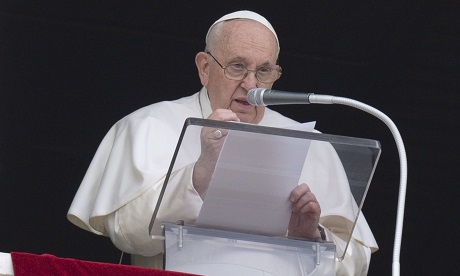We should treat other people’s physical and social differences as a chance to love better, not as an inconvenience, Pope Francis said on Sunday.
After leading the Angelus with the 25,000-strong crowd in St Peter’s Square, he reflected on the day’s Gospel, which recounts Jesus’s miraculous healing of the blind man.
Pointing out the different reactions the story’s characters had to the miracle, Francis invited people to think about how they might respond in a similar situation.
“How do we welcome the difficulties and differences of others? How do we welcome the people who have many limitations in life, either physical like this blind man or social like the beggars we find on the street?” he asked.
“And do we welcome these people as inconveniences or as occasions to draw near to them with love?”
He encouraged everyone to read St John’s Gospel, Chapter 9.
“Read about this miracle” of the healing of the blind man, he said. “It’s beautiful the way John recounts it.”
“You can read it in two minutes. But it shows how Jesus proceeds and how the human heart proceeds. The good human heart, the lukewarm human heart, the fearful human heart, the courageous human heart.”
Some characters are skeptics. Others find it unacceptable.
“In all these reactions, for various reasons, there emerge hearts closed in front of the sign of Jesus,” he said.
This is “because they seek a culprit, because they do not know how to be surprised, because they do not want to change, because they are blocked by fear”.
This is similar to many situations today, he added.
“When faced with something that is really a message of a person’s testimony, a message from Jesus, we fall into this: we look for another explanation, we don’t want to change, we look for a more elegant way out than accepting the truth.”
The blind man is the only person who accepts Jesus’ gift well, the pope explained.
“Happy to see, [he] testifies what happened to him in the simplest way: ‘I was blind, now I see.’”
The Gospel invites us to imagine ourselves in the same scene, so we might ask what our own reaction would be, Francis said.
“What would we have said then? And above all, what would we do today? Like the blind man, do we know how to see the good and to be grateful for the gifts we receive?
“Do we bear witness to Jesus, or do we spread criticism and suspicion instead?
“Are we free when faced with prejudices or do we associate ourselves with those who spread negativity and gossip? Are we happy to say that Jesus loves us and saves us, or, like the parents of the man born blind, do we allow ourselves to be caged in by the fear of what others will think?”
Or are we “the lukewarm of heart who do not accept reality, and do not have the courage to say: ‘No, this is how it is.’”
Source
